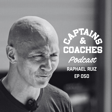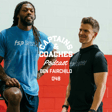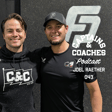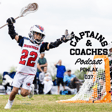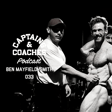Introduction to Leadership and Emotional Stability
00:00:00
Speaker
This is going to be a strength training exercise for your leadership. You're going lock in. to have a good session. When you get home, if you need to cry, whatever you to do it. Show the team your teammates that you can you can be emotionally stable even when when that it's not your best day. And then they usually appreciate that because it's just it's about them and it's about them growing as a leader, not just them growing their squad. Welcome to the Captains and Coaches podcast. We explore the art and the science of leadership through the lens of athletics and beyond.
Meet Eric Hernandez: Transforming Athletes into Champions
00:00:25
Speaker
I'm your host Tex McQuilkin and today we're rolling down Tobacco Road to connect with one of UNC's leaders behind the scenes, Eric Hernandez, the Associate Director for Strength and Conditioning at Carolina.
00:00:37
Speaker
This passionate coach has helped transform Tar Heel athletes into national champions while developing a training philosophy that's as powerful as it is personal.
Building Player-Led Cultures: Communication and Accountability
00:00:47
Speaker
Eric brings an approach that makes great teams extraordinary, showing us how honest communication creates unstoppable athletes.
00:00:55
Speaker
You'll hear how he builds those player-led cultures where accountability isn't just talked about, it's lived daily. With that, let's hand it off to Eric. Ready, ready, and ready.
00:01:05
Speaker
Music I'm loving that shirt you're rocking there, Carolina Lacrosse, man. you got something special cooking, as always. Well, thanks. I'm the smallest part of it, but ah um you know I'm pretty lucky to be a part of Carolina Lacrosse.
00:01:22
Speaker
Yeah, a national championship to boot a number of years ago, man. How'd that feel? That was fun. That was the that was good. so I worked with the women's team for for eight years, um and so I was be able to be a part of their 16 and 22 national championship. um and yeah i mean It's really fun to to see the kids. on the and yeah In the year, there's only one team that's really happy, and and it's it's fun to see the kids. ah um that ah that are happy
Eric's Journey: From Aspiring Doctor to Coach
00:01:51
Speaker
at the end. And and it just, it's all pay off and just be like the smallest part of it. And it's really fun. like I think this first one, you know, i won't lie, you know, i I thought it was awesome.
00:02:02
Speaker
And the second one, i was like, These kids are awesome. like you know it's It's fun to watch them. so excited and know everything that they do. and and and Like i said, to see the one team happy at the end of the year. and I just sat back and watched them all rush the field and and just like smiled. Maybe it's because i had kids and i had kids then. and and i was like you I just knew the feeling of them kind of doing their own thing. So it was fun to just watch everyone rest the field and hug each other and cry and stuff like that. That was pretty cool. yeah did Did you get a a piece of the net for the championship?
00:02:36
Speaker
I did, yeah. i I got a little piece and cut a couple pieces for our interns. And um yeah, and so yeah I still got a little momentum. momentum Man, that's great.
00:02:50
Speaker
Yeah, just that i've I've attended the LAX Final Four for the men's in Baltimore. So a number of times, yeah, I was going to school in D.C. So then would go up just that Memorial Day weekend for the men's championships.
00:03:05
Speaker
And even though I was not part of the team, just seeing D3, D2, D1 rush that field is special. it's It's funny because I, growing up from Illinois, like I didn't really, Memorial Day was just a you know, cool little, you know, long weekend. It was nice out, whatever.
00:03:25
Speaker
um But now having to been a part part of lacrosse for the past year, 14 years, um you know, Memorial Day weekend is is a completely different
Holistic Athlete Development and Mentorship
00:03:34
Speaker
weekend. It's um it's the coolest weekend in the year.
00:03:37
Speaker
I also started picking up golf six years ago with our golf team. And and it's also ends up being the same weekend as um as as the national championship for for golf. So funny story is ah after we won 22, I flew out that day to San Diego because our men's golf team was in the, uh, national or in the tournament and they ended up getting, getting the lead eight for the first time, you know, I even know when, um, and that pretty cool. So it was, it's Memorial Day weekend is, uh, uh, my wife now knows that like, don't plan anything that weekend for because I'm hoping be, I'm hoping to be, helping some other people, uh, uh, get, get a championship.
00:04:17
Speaker
Yeah. Yeah. well Your experience ranges from sports from all over. Where did your athletic career, which then led to coaching career, begin with what sport? So I was a track and field athlete originally. um You know, in college, I went to Loyola University in Chicago.
00:04:34
Speaker
ah do you I went to for a year then I transferred, but I was a shot putter and I used to be about 50 pounds heavier. And so ah so, I mean, like, I just loved track because it was just like the purest form of athleticism, you know, you're running, you're throwing, you're jumping.
00:04:50
Speaker
And, um, you know, it was just a really cool, it just fit really well with my love for the weight room. um That's kind of what led me to eventually be a strength and conditioning coach just because I was around it so much.
00:05:02
Speaker
I wanted to become a doctor, but I failed miserably the MCAT. And then I decided I'm never going to study for that again. And I just started working as an intern at Loyola at Arizona State University, came to Carolina as an intern, went to Tulsa as a GA <unk> for a sport short time, then came back um and been back full time ever since 2011 at Carolina.
00:05:25
Speaker
Man, that's got to feel good, dude. So do you miss that that path to becoming a doctor or glad that you found exactly where you were meant to be? um No, I don't miss the path at all. You know, it's funny because I wanted to be help people when they got hurt because I had some injuries and and like ah it was just so important
Training Approach: Basics, Customization, and Communication
00:05:44
Speaker
to get a good help when when you're on the other side of things.
00:05:48
Speaker
um I don't know if I just rationalized myself to feel better about failing the test, but then I thought, well, you know, now... ah help people not get hurt, you know, as much as it can, you unique can't prevent everything obviously, but you know, I've taken a different approach to training, you know, as a thrower, I was a complete meathead. And like, you know, you talk about someone who, you know, only care about his lifting. Like that was me.
00:06:09
Speaker
Um, but I, but I was forced to learn a lot about health and, um, but keep the the fun lifting and and all the pure things of training in mind the entire time, but realize how much of a importance of of health and and wellbeing and being holistic head on it. So, you know, I still have that feeling of, you know, dun and I'm not saying I'm a doctor, but I still have that feeling of this wellness ah um you know journey and strength conditioning. And I think a lot of my athletes, the people I work with, ah a really appreciate you know me taking a little bit of a different approach other than only caring about driving up squat numbers and bench numbers and things like that, which are you know are cool too. But there's a lot more to it than that.
00:06:54
Speaker
Yeah. and And that perspective shift, did that occur when you were coaching? Did it occur when you were an athlete and you got hurt? When did that that investment in the whole athlete start to take over for you?
00:07:08
Speaker
I think, you know, takeover was probably, you know, earlier in my career when I met, when I had some really good mentors, um you know, as an athlete, yeah, I did, but it wasn't like the same way, you know, it was an athlete. It's like, oh just got to train hard so that, so that I can, you know, um you know, handle,
00:07:24
Speaker
stress the sport. And then I got to, you know, around some people who were a lot healthier than I was. And they, you know, they they would look at my diet and they'd make comments and they would look at like, you know, you know, r I would, uh, I wonder why my back hurt.
00:07:37
Speaker
And then, you know, you know, like, well, what's your technique? And then like, you know, this it was, it was just things that kept slapping my face. I'm like, oh, I guess I can't, you know, hide this anymore. And, and, and then, um, you know, I just had really good mentors that that taught me towards or like ah pointing me towards,
00:07:52
Speaker
you know aspects of nutrition of therapy of recovery and like um in that whole rabbit hole that i pursued because personally it mattered to me my health and well-being but then i could also you know apply it to my athletes apply it to my family yeah that that is a an evolution most coaches they don't go down that path they learn one way one thing and that's the way no matter what.
00:08:20
Speaker
And then it's cool that you've had these different sporting ah opportunities to learn different variations.
Leadership, Accountability, and Flexibility in Coaching
00:08:26
Speaker
You certainly have to make adjustments from training a golfer to a football player just due to the the impact for the sport and the necessary rotation.
00:08:37
Speaker
So where does that balance come into play for you where, okay, I'm not going to train everybody the same way or I'm not going to train them like I was trained. I need to make different adjustments for different teams.
00:08:50
Speaker
And then that also leads to the the the emotional development, right? You're working with men and women. So a lot of coaches just, hey, they played football. They stick with football. So was it a movement based first? Was it this social, emotional development of athletes?
00:09:07
Speaker
Like what led you to this, this confidence to step into any sporting arena, men, women, and just empower them?
00:09:18
Speaker
I think the biggest thing is I've always, I've, I've, I keep going back to a mentors because I've, I've learned from some people that I consider my best. I like the best in the world. And And they didn't overcomplicate things. They they didn't try to say everyone like was so special, you gotta do this program for this and this that.
00:09:44
Speaker
There was just so much that everyone needed and that's where you start. And that's where you finish, but that's where you start. And you find
Managing Group Dynamics and Promoting Self-Awareness
00:09:52
Speaker
that so many people, athletes, whatever, they have the same start right and it's just uh if i'm looking at like or what do all the athletes i get to work with want they want to be better okay and they they want to get better but they don't necessarily know what that means so so they need to know what that means they need to know what that entails so i'm very clear about my intentions with coaching all of them whether it's the volleyball team and golf team men's lacrosse team uh private client you know older person whatever it is or it's like here's where you want to go
00:10:33
Speaker
Here's what that entails. It's hard work. It's consistency. It's doing the basics well on a consistent basis. um If until you can get all that.
00:10:46
Speaker
Done on it all the freaking time. It doesn't matter. what extra mobility you drill you do it doesn't matter what those other things you can like we like you don't talk to me about those those this those finite details until you can do the general stuff well and here's why it's good because when you come back to me and tell well you know my external rotation is kind of limited on this side well you train once a week you you sleep poorly you're dehydrated you don't eat great like Do you have other issues that are more important than that, that you need to fix?
00:11:18
Speaker
And, and then, and like, and here's how it's going to help. You know, when we train, you don't listen to me when I tell you about how your shoulders speed position, i heard things like that. So this is where, this is why we where we need to work on first.
00:11:29
Speaker
um It doesn't, and I tell them, it doesn't mean I won't help you with that. it it just i tells you that like, you are not like, this is where we need to start with because that is just the smallest, you know, that's just the tip of the iceberg.
00:11:40
Speaker
So I'm very clear, be very clear about like just the general principles that are hard to to to lock in on and get better at. um And then,
Developing Future Leaders: Coaches and Athletes
00:11:50
Speaker
so like they all need that, right?
00:11:52
Speaker
an And then I just have to figure out like what part of me appeals to them the most. um You know, if it's my lacrosse guys, you know, They want to be pushed hard. They want to be held accountable.
00:12:05
Speaker
They want no BS. They want someone that's going to meet them with force and and push them um and not put up with any BS because it's just, it's it's a big group, right? So there's like, it's like managing a little bit more my My volleyball team, they want to be really good and they're all motivated and they want someone that's gonna keep things tight in the weight room and they're gonna keep them, like they wanna come in and they wanna know they're working towards a purpose from start to finish.
00:12:40
Speaker
And if not, that's when they start to lose. I think any athlete does like at that. So, you know, I'm saying this for this team, but like ah it's just because it's something that i've been working on recently. They start to finish, with everything has a purpose towards their goal of, you know, successful to end of the season.
00:12:54
Speaker
All right, so, you know, I don't have to necessarily ah meet them with all this for, I don't have to all this stuff unless I have to, you know, unless it's getting a little relaxed or unless, um you know, a big thing I use to communicate with them oftentimes is health, right?
00:13:09
Speaker
Is it, okay, ladies, listen, we're we are not getting, hitting the mark on this and here's what's gonna happen. Shoulder issues gonna pop up, low back issues are gonna pop up. I need you guys to focus. I need this happen because of this
Relationship Building with Coaches and Player-Led Teams
00:13:20
Speaker
And then they snap in and they and we do a great job. um But I don't just sit there and hammer them the entire time because they they. they It's a tool that won't be useful anymore if I just overwhelm them with me yelling and and things like that.
00:13:34
Speaker
And and there's days they have days with it like they they're they're not afraid to communicate with me that when they have off days, you know, and and I'm there and i I'm clear from the beginning, like I will be there for those days. So let me know.
00:13:45
Speaker
But doesn't mean I'm giving you an easy way out because going back to the original, they don't want they don't want the easy way out. They're here for a purpose. And then my golf teams, they're not really any different. um They want to be better. They want to be great.
00:13:57
Speaker
And I've just been really lucky that um I work from some head coaches on all the teams who really like trust me completely to do what I need to do to, in order to, to, to push the team along towards their, their goals.
00:14:11
Speaker
um You know, I'm, I make sure they understand I'm well-read that I don't know all the answers, but I'll figure it out. I'll figure them out with them if I do don't. And that my, my intentions are clear and that we have to be great in the weight room, maybe not in the sense of the heaviest or whatever, but we have to be locked in and we have to be benefiting these things because you may,
00:14:32
Speaker
You may not be a national champion, but you will live for the rest of your life. You will ah you train for the next four years with me. So it just has to be good. It just has to be good because it's safe and it's it's going to make you, you're going to feel more accomplished about what we're doing.
00:14:47
Speaker
And it's just, people fall in the line really quickly about which one to listen and and get pushed. And then when they know their intent, your intentions are pure, it's just like, I don't want you get to hurt in here. And I want you to, i want you to feel the benefits of, of what's going on.
00:15:03
Speaker
Um, and sometimes I'm louder, sometimes I'm quieter. you know, I, i I like being allowed and interactive and a coach like that, but not everyone responds well to it. So I got to figure out what part of me responds well to it and just lean into that.
00:15:17
Speaker
Whether it's the, you know, making some jokes here and there, or whether it's like, you know, being, being aggressive here and there. and i just kind of think and take the first few weeks and kind of figure out where everyone's at usually.
00:15:28
Speaker
Time out! Every so often
Training Environment Setup and Integrating Freshmen
00:15:30
Speaker
I receive messages that remind me why we created the Old Bull program. Today I want to share Kevin's story with you. Not just because it showcases physical transformation, but because it represents what's possible when training evolves beyond just sets and reps.
00:15:46
Speaker
Kevin recently reached out with a message that captures the essence of what we're building. Here we go. Hey Tex, this is Kevin from Old Bull. Just wanted to shoot you a quick text to say I'm really digging the program and seeing great results.
00:15:59
Speaker
Made a few dietary tweaks, up my protein for one, but through the training I've been seeing more muscle and strength gain with infinitely less pain in the process.
00:16:10
Speaker
than probably any other point in my lifting career. I recently got together with some friends I hadn't seen in a couple years and every one of them made a comment about how they've never seen me looking bigger or stronger than I do now.
00:16:23
Speaker
Appreciate the program and what you're doing to make it excellent. Here's what really matters. This isn't about quick fixes or unsustainable programs. Old Bull engineered for the experienced lifter who values longevity as much as they do intensity.
00:16:40
Speaker
we're talking about intelligent progression that respects your body signal while constantly pushing your boundaries. If you're ready to transform your training into something more sustainable, more intelligent, and ultimately more impactful, the Old Bull program is your path forward.
00:16:57
Speaker
Click the link in the show notes and take control of your strength journey today. There's a lot of takeaways there. And one thing I want to highlight for managing the whole group experience, there's a ah difference between leading the group the The intention, the motivation, the emotional state of an individual, and then the the team.
00:17:18
Speaker
Sensing that emotional face and stay ah stage of the team and leading it. So now if you're in that team mode and leading that group, whether it's in a training session in the weight room or the field or getting them ready for a game,
00:17:33
Speaker
and you sense that one person that's off, what are some tools and approaches that you you take to leading now that individual who's just having that bad day, like you mentioned?
00:17:45
Speaker
Yeah, it's a good question, right? um If you can sense it's kind of like an emotionally bad day, I'll usually just kind of like in the warm-up line, I won't make a big deal of it. Like I'll walk by them while they're doing a drill and be like, you're right, and you good?
00:17:56
Speaker
What's going on? And like try to get a sense of like, I want to give them the opportunity to like, to like to unload on me in a quiet, not like overwhelmed state, you know, so they can just be like, hey, like this, this, and that, of and then I'll tell them what I need out of them for the day.
00:18:10
Speaker
You know, hey, I just need you to get the reps sets reps in today. It's just going a good day for you to work on overcoming, you know, um you know, I won't be on your ass today, but ah just know that like, I
Preparation, Expectations, and Brutal Honesty in Coaching
00:18:22
Speaker
I still need you bring what you have. And if you need a break or whatever, you just let me know you just, know but I won't make a big deal of it. Now, if they tell me, it's like, yeah, you know, if it's something like not so serious, that's awesome.
00:18:35
Speaker
And then if they're a leader, because that's important. I had, it you know, talked with a girl the other day like this, like, Hey, you know, you're one of the things you want to do this semester is like become a leader. Now that we've had some people graduate, leaders can't have bad days.
00:18:49
Speaker
Like I know you're maybe not feeling off, like unless it's serious and like like, unless you really need something, like you need to find a way to kind of overcome that a little bit and, and just know that this is going to pay off big time for you later on in your life.
00:19:03
Speaker
Like, I think I believe in you that you could do it, but you need to step up. you know, and and I know those, I know that person before that. so i'm not going to tell them step up if they're telling me like their dad died and and something's crazy like that. But if it's something minuscule, like I want them to know, like this is going to be a strength training exercise for your leadership.
00:19:21
Speaker
You know, like you're going to, you're going to, take that mopey face off. You're going to lock in You're going to have a good session when you get home. If you need to cry, whatever you need to do it. But you're going to, you're going to show the team, your teammates that you can, you can be emotionally stable um even when, when that it's not your best day. And then they usually appreciate that because it's just, it's about them and it's about them growing as a leader, not just them growing their spot.
00:19:45
Speaker
um And then there's some times where, you know, there's the guy or gal, you know, that just, They're kind of a knucklehead, right? But they're going to get themselves or someone else hurt.
00:19:57
Speaker
And if I know they can handle it, I'll, I'll tell him I'll call them out in front the entire group. You know, with men's lacrosse, I'm very honest. Like and I'm from the beginning, like I stole this from my buddy, Brian Peters, but it's like yeah negative reinforcement is not negative.
00:20:15
Speaker
It's not bad. words. You need negative reinforcement to know where the hell are we going? Because negative reinforcement is like the guardrails on the road.
00:20:28
Speaker
You go this side, you're going to fall off a cliff. You go this side, you're going to fall off a cliff. So don't go on those sides. Right. And because
The Athlete Within Project and Online Training Transition
00:20:36
Speaker
some people are yeah so worried about like,
00:20:39
Speaker
If you tell them don't do that, then they're going to do it. And then everything goes to hell. Like, no, well, sometimes I need to tell a kid don't fucking stay in there. Sorry, my language, because they're going to get hit with a barbell if they don't.
00:20:50
Speaker
So if I don't say that to them, then like we're going to have an issue. So if it's the guy that's messing up his rest interval, messing up his weight selection because he's whatever and he gets hurt.
00:21:00
Speaker
Well, it's my fault for not telling him don't do that. And it doesn't always work out like it doesn't always work great, but I can at least sleep at night knowing I told the kid stay within your percentage. No, you can't go up and wait.
00:21:11
Speaker
Right. Because I've had a letter way where kids just go off in the willy nilly and then they get hurt because they choose the wrong way. You know, I set it out there for them. So they have to know, go back or negative feedback. Don't do this. Then I put the positive feedback is like what puts fuel in the car to keep it on the road.
00:21:27
Speaker
So I'll use that, and like going back to what I'm saying about the group setting and and and and individualizing in the in and a big group. One, I'll tell a person, hey, I told you five times in this drill and now we're running because you have not paid attention. So I don't know what's going help you figure out, um you know just that we're we're with the process, you're with the team, but X, Y, and, you know, whoever your name is, you're the reason why we're running right now.
00:21:53
Speaker
And usually that kind of cleans that up because I need that negative feedback loop to be quick. So they don't get hurt so that someone else doesn't get hurt. Now there's also some, those things on the other side of the spectrum. Hey, so Johnny, good job.
00:22:06
Speaker
Like yeah that is exactly what we need today. You're, you, you're locked in. You did great. And guess what? I've been seeing your squat numbers go up in the past six weeks. So you follow the process. Good job.
00:22:17
Speaker
um but So I think like, uh, tactfully choosing, acknowledging someone in front of the entire group and not always the same person is really important for um just everyone to kind of be aware of so that you can manage the group better.
00:22:34
Speaker
If you know that you're not hiding in the group, well, then you're going to fall in line a little bit easier for the better outcome for everything we need to do. Yeah. And a lot lot of those youth, whether high school up to the college athletes that you're working with,
00:22:48
Speaker
like they're so in their own mind. they're not necessarily They may be self-aware at this stage, but they're not necessarily social socially aware, especially those freshmen who are so internalized, so they may not realize how their actions are affecting others.
00:23:04
Speaker
So I certainly see how the the guardrails you're putting in place, it sparks a social awareness where, oh crap, I'm not the only one here. So my decisions safety in the weight room especially affect others, which then leads to my decisions in practice affect my teammates.
00:23:23
Speaker
And hopefully we get some responsible decision-making off the field. the ah What I like there too is is emphasizing if this person is a leader or they've expressed they want to be a leader, now our standard has increased.
00:23:40
Speaker
So now my question for you What if you see potential in the the freshmen and sophomores? They may not express that they want to be a leader, but you see it. You sense it. You've been around teams 15 years, ah national championship teams, you know.
00:23:57
Speaker
So now where do you, so if you see the spark in that freshman or sophomore, how do you start to really ignite it and light it to create some potential in their mind that maybe one day they can step into a team captain role?
00:24:12
Speaker
um I usually honestly start with the the coaches um because they know the kids way better than I do. And, and you know, that doesn't mean that i don't know them well, but I mean, like these coaches' job is literally to learn everything about them as a youth and then like know their families and know everything.
00:24:28
Speaker
So if I notice like a a younger kid, like, hey, so-and-so could like, so-and-so's kind of got it what do you think about them? Like going forward, I'll kind of get their feedback. Like, yeah, we're going to need the her to be a leader. We're going need him to be a leader.
00:24:39
Speaker
And then, and once I kind of get that, kind of start to poke, poke and prod a little bit of, you know, of him maybe maybe I'll give them a little opportunities or to lead, whether it's a breakdown, whether it's tempo, whether it's a start, whether it's like a, you know, something small like that. So I can just kind of see how they react.
00:24:56
Speaker
And then I, I just, I asked him straight up, like, you know, you know, do you think you want to be a leader? It's usually easier with like a big team, right? If it's a small team, it's hard to like ah necessarily always identify leaders.
00:25:08
Speaker
um Like golf, it's really hard to have like a leader person. um Not that it can't, but it's just individual, you know, ah but like probably the easiest example to start with is like, you know, um our men's lacrosse team, like I said, to like there's not going to be one.
00:25:27
Speaker
And there, and some of the, like ah the guys will be very honest and be like, dude, I'm not really a vocal guy. Like, I'm not, I'm interested that. Like I'm going play. And that's how like, all right, well, guess what? You're going to be lead by example and that's okay.
00:25:38
Speaker
And that, but I'm not push you to do something that you're not comfortable doing and that it's not organic to you. Um, but you know, when you get an opportunity, make sure you do speak up and, uh, you know, it's just so like some people are not vocal leaders. Um,
00:25:53
Speaker
And I've found that out more recently because there's like the best player, the hardest worker. I'm like, Hey, I need you to get up. I need to hear you more. And they're like, dude, I'm not really like that. i'm like, all right, well, I got you.
00:26:04
Speaker
I got you. You know, I get that because it's to force it. And then people aren't going respond. um So it's, it's, it's, I, I just try to really like small conversations, see where they're at, see what the coaches think.
00:26:23
Speaker
And I don't always, you know, hate on developing the leaders, but sometimes I, sometimes I do, you know, and then it's really fun. like I kind of keep holding them accountable. As soon as they tell me though, that they are interested in that, well, then they're not going to hear it from me.
00:26:38
Speaker
They're not going stop hearing from me. Excuse me. Um, and then I'll, I'll intertwine like, Hey, that's a leadership moment. and Like it seems small, but that's a leadership moment. And then they kind of start to put it together and, um, At worst, they come out and they just understand leadership better, even if they don't end up being the leader.
00:26:54
Speaker
Yeah. Yeah. the the The relationship with the coach, it it doesn't just end at leadership as well. Speak to us about just flexing your program to what that coach needs.
00:27:08
Speaker
So there's certain offenses, defenses within the realms of sport, which then changes how you prepare your athletes. So now speak to us. ah Let's just focus on year one, new head coach taking over or you're stepping into role.
00:27:25
Speaker
ah How do you start to build your program based off of the demands of a coach and reverse engineer from your perspective? So, you know, we've had we had a um some coaching turnover in the past couple years. So, ah you know, essentially i experienced this recently.
00:27:43
Speaker
It's not the full coaching turnover, but. um you know, enough that like, it was a, it was a big moment. So I would base, know, and, and young young coaches have to realize like, we work for the head coach.
00:27:57
Speaker
Even if I don't get paid by the head coach, I get paid by administration in order to service these teams. When I'm with that team, like you work for that coach, you are an extension of that coach, good and bad.
00:28:11
Speaker
um Everyone has a boss. Everyone has to do things that they don't want to do. It doesn't mean you have to do negligent, like you have to practice negligence. But like if your, if your coach is telling you this is important for their program and where they want to drive things and the coat and the athlete feedback, well then it has to be important for you. And you have to find a way to integrate that into your pro in your, in your session.
00:28:35
Speaker
um So you have to get, and start by just getting feedback from that. Like, what do you need? What do you want to see out of this? And Then from there, and and then I just kind of if I'm unsure if they're going like something, I just say it. Like, here's how here's a plan that I would think would would fit well with what you want to do.
00:28:54
Speaker
I would do this, this, that, and the other thing. Is there anything that you have ah an exception to? No, I think that sounds good, Eric. Just make sure you do this. You write it down, make sure they know. And then I repeat it back to them. Like, so this is by the end, like this is what we're on the same page about.
00:29:07
Speaker
Yes. Okay, good. So if I have to do this, like I foresee the potential conflicts, right? When I have to get after somebody, when I have to make an adjustment and when I have to communicate something to them, like, and I try to get ahead of that. Like, all right, you know,
00:29:22
Speaker
When that pops up, you know, do I have the freedom to kind of handle this as is? Is there a certain way you want to handle it? No, it's your Eric. Okay. This is, I probably want to do it just so you're in the loop on things. All right. Thank you. um You know, Hey, i present you with, with a kid that we need to back off on in season. How do you want me go about that? Like, i don't want to like, you know more about this than I do. So I wanted to present some of stuff from my end, but I don't want to get ahead of this. So you're not in season being like, well, Eric, like,
00:29:48
Speaker
this isn't the way I want to hear that I need to pull back. You know, so I'm just, I really try to anticipate things that could come back and be a conflict later on and make sure that I communicate that effectively with them. Like what what what what works best for them?
00:30:02
Speaker
um You know, we we work for them. How do I integrate it in and how do I do things that are true to me? Right. um And not, I'm not, I'm not afraid of being Hey, I'm not really great at that.
00:30:13
Speaker
Here's a, here's alternative of what I am comfortable with. Does that work? If not, I'll try to get better at something that to make it, make Matt mess up with you better. But I have a pretty good of relationship with coaches that, you know, they usually trust me to do things. But like, you know, this past season, you know, we really wanted to work on a player led team and holding everyone accountable for every single thing that we did.
00:30:35
Speaker
And so I, that's, that's just what I did. And I was told him from the beginning, like, guys, you are not going to be able to, um you're not going to be able to get, we're not, i'm not gonna give you an inch. Just so you know, it's not me being ah jerk. It's like, this is what the whole this is what hard coach coaching staff is is on on page with. So and I'm an extension of them.
00:30:55
Speaker
So if if you get pissed at me, that's okay. I'm doing it best for you. And you can ask the coaching staff if you have a problem with it. So it just makes it really easy. If you're on the do the coaches and the kids know that you're on the same page as them, then we all have the best interest in them. They're best interest in mine.
00:31:12
Speaker
Yeah, I ah like that. Player-led team. And the big part of that is we need to teach them how to lead their team. We don't just hand them the keys and let them go get a bunch of speeding tickets and have a bunch of car accidents.
00:31:26
Speaker
So now think about that player-led team. How are you communicating to your your interns, your assistant coaches, your staff to establish this player-led team?
00:31:39
Speaker
And then how does that conversation differentiate to you communicating to the players, this is a player-led team? So reframing that question, like how am I telling my staff to administer this?
00:31:51
Speaker
And then how am I painting the picture of the responsibility responsibilities to the players? It depends on the the maturity one of both, the players and the staff. um But like, you know, we get a lot of interns that they may they only there there for a few months. They may they they may have never trained or done anything before. So I just got to be clear with that. Like, they're not going to probably be the person to...
00:32:16
Speaker
enforce a player-led team unless they have been around the team long enough. Their job is to, I'm clear about what their job is. It's the coach. Here's the racks you're in charge of. Here's what I need you to do.
00:32:28
Speaker
um So they don't really play a role in that in that system ah because of the inconsistency they'll have with a team. Because the athletes see this stuff really quickly. They'll they'll be like, well, why are like, you're younger than I am. Like, why are you telling me that I need to hold someone accountable? So I don't put them in that, in that position to to be wrong, if that makes sense.
00:32:50
Speaker
um But from my standpoint, like I try to, it doesn't, it's it's a very, very hard thing and it has to be from them. Right. So it's not like every team I'm like, Oh, you're a player the team, you're player of the team.
00:33:00
Speaker
Like it has to be kind of from their, their, their culture and like what they really believe in. And, and, And so I've kind of laid out some simple things and I tell them about how that's going to play out later on and what it means if you don't do it.
00:33:20
Speaker
For example, you know, all right, use your rack. You got four guys to your rack, three or four guys to your rack. Here's what I need from from your team. You're either lifted, you're spotting,
00:33:32
Speaker
You're counting tempo or you're getting ready to help with the next set. Right. And if you if if you guys if I have to come through and tell you things over and over again, that means you are not leading your rack correctly.
00:33:47
Speaker
So if you don't, if you guys go over and wait, if you don't do the tempo correctly, if you don't call it Tendo unit, like we're just going go out run. And I hate doing running as, as, as quote unquote punishment, but with some groups you like, it's like the only thing that gets them to go through.
00:34:06
Speaker
So i' just make it clear, like if this, then this, if not, then we're good. You know, if you catch a guy doing something wrong and you fix it before I have to say something, well, good job. That's what you're supposed to do.
00:34:21
Speaker
and And I also like, yeah so and then so they understand like X, you know, this this equals this. Okay. and Keep it black and white. You have to. And the other thing I'll say is, well, our here's what's going happen.
00:34:33
Speaker
So-and-so is going to get pissed off at so-and-so because they're trying to tell them what to do. Well, guess what? I am telling you right now that they're supposed to do that. So if you have an issue with that, that's a personal issue that you need to figure out because it is it is black and white.
00:34:48
Speaker
Hey, do this. Coach said this because this. And like, you know, hitting that up, like being just being upfront about it, like ah hey guys, it's not, it's not about feelings. It's not, you guys have to learn to take feedback from peers because it's going to show up on the field and you're going get pissed off.
00:35:04
Speaker
If you can't just understand, this is just transactional. This is just us, you know, saying facts and saying what you can't see. Like, and just talking about like those uncomfortable situations that I've seen enough times.
00:35:16
Speaker
But then when I do a good job, I make sure I go back to the positive reinforcement. Hey, that was excellent. So-and-so, like you caught you saved so-and-so from a running around. Hey, that was great lift. like today like Like we had a lift the other day, and and i I think I said, you know – I don't know what i I barely said anything during the session. I was like, that was a great session.
00:35:36
Speaker
Like I didn't have to yell you guys at all. I love doing that. Right. But it's because you guys have earned it. You've worked on it. Like, uh, so making sure I acknowledge when, when they are doing what they have wanted to do.
00:35:49
Speaker
Um, you know, every, at the end of the every week, I try to kind of highlight good things we did, things, mistakes we made, um and where are we going to go for the next week? And it would always be around that approach of like, how, how are they driving this team?
00:36:02
Speaker
Which, which direction are they driving it? And so there's no question mark of like, where where are we at? Yeah. And now, For your lifting racks, how do you organize your racks? Is there like seniors all the way down to freshmen per rack?
00:36:19
Speaker
Or is it based off of position? Or is it based off of, yeah, seniors over here. I keep my freshmen over here because they're learning this stuff. How you organizing that way around with team sport?
00:36:31
Speaker
So when we first get on campus, like when we're back from training, freshmen are usually always or back from home. Freshmen are usually separate, like if they're new exposed newly exposed. and And depending on the maturity lifting of the group and intern help, if I have any, I like to be with the freshmen for the first few weeks as much as possible because they need to learn my system. They need to learn how we're going to do things because if they don't, then it's going to make it tough for them later on when I'm trying to coach them in the group.
00:37:00
Speaker
So i try to, I try to be with them if I can, but it's all proximity. Like, so I can be with them, but see everything that's going on. Um, so that's one thing. And we usually try to keep freshmen separate for, for the lifting stuff. But like, you know, it depends on the maturity. Cause like, for example, like men's lacrosse,
00:37:18
Speaker
the thought of my squatted and benched and then all that stuff like growing up. So I don't need a lot of separation, but the Olympic lift variations, I always completely like there's a different progression for them. They may squat the same, yeah usually front squat them first, but like, uh, they usually do same set rep volume and stuff like that as, as, as the, uh, the upperclassmen.
00:37:39
Speaker
Um, But as you're asking, situationally, i still separate them out until we get a few phases in and then I try to integrate them in um And then once we get like kind of a, you know, 12 weeks of training underneath our belt we're all on the same, pretty much the same page.
00:37:58
Speaker
you know Within those groups on the way there, it's height and strength differentiated, so not changing bars all over the place. But I want to get them in the mix. And then as we get further along, um you know again, we lift with a team, right? So there's 52 to 56 guys in there at a time, and there's only one of me so I have to try to think about a lot of different things. So I kind of plan out where I'll get who will I know leads to modifications.
00:38:29
Speaker
Okay. Uh, who are the starting group? Because I need to see every rep of theirs. Um, um,
00:38:39
Speaker
and I kind of start there. Okay. making Then I'm going to be on those racks. I'm going to have ah you know, my part-time or my intern on these racks. Um, And it just makes it, eat and then I think about, then i as I get to, I make sure that every part of the room has kind of a weight room leader, right? So even though and can't be on, you know, on 20 racks at once, I have some kind of leader strategically placed through the weight room that I know they'll kind of nip something in the bud if they see it.
00:39:09
Speaker
Because it's hard as an intern to be kind of like, you you know, there's a new intern to tell kids what to do. And when like, you haven't even like, they've been training here longer than you have. So and I just know that's not an easy thing.
00:39:23
Speaker
doesn't mean I don't expect them to still help, but like, ah i still try to position out the weight room that way. And then, like I said, i have to be by, I'm usually very active in the lift, but I need to also know if I could stand somewhere, I'm going to see pretty much every starter and what's going on.
00:39:38
Speaker
in one, one footprint. And then I go around and make sure things look good. Come back to my footprint, make sure, you know guys are taken care of, go around, make sure things are good. Um, so those are kind of like the dynamics of, of where in year and how I set the racks up.
00:39:51
Speaker
Um, and it always changes. Like when I give more help, when I have more consistent help, it changes, but I just have to make sure that every time I'm really, I'm doing everything I can to get the coaching quality high and to keep the, uh, the, the group itself able to control itself via, via leaders around, but also just like anthropometrics, like it matters. Cause if you put the short guy in the tall guy's rack, they're going to be going all over place. And all your racks are all mixed up. So that matters.
00:40:24
Speaker
Yeah. The, ah ah I love to hear that. the When I was at Georgetown University, was Coach Warren's first year. So we had a system where we had the the freshmen separate.
00:40:37
Speaker
And then immediately, it just was like, no, I need those guys lifting with the older guys. And just so happens that particular class, they they were not football guys, they were fresh to lifting.
00:40:50
Speaker
However, it was, okay, we got to give our leaders an opportunity to lead every rep. Literally, they can. so it was just like, all right, we got we got to be thinking on our feet.
00:41:01
Speaker
And then it was we had two coaches, myself and then Sean Foster, who's still at Georgetown, but with soccer. And so we were we were just all over the weight room. But then... quick to, you know, see man, see ball.
00:41:14
Speaker
We're going to keep our eye on that rack and that individual when it's his time to to squat. So it was, it was fun, you know, heightened coaching environment experience. um I liked that.
00:41:25
Speaker
Now think think beginning phase of season where ah fall for lacrosse guys are just the start of the season guys are back on campus and we need to take these freshmen and really integrate them or transfers and integrate them into the team.
00:41:39
Speaker
What are some safe team building exercise, fitness, enthusiasm tools that you use that are protecting against what a lot of ah coaches want, which is like the military training. And then I'm going to get to it, but i don't know if you saw the Tufts University captain's practices, but what are some safe tools that you implement right in the beginning ah when dudes are back on campus to help shared suffering and bring your guys together safely?
00:42:11
Speaker
Yeah. I mean, really the only, the only difference for the freshmen is that like, uh, they're going do an Olympic variation and differently and progress differently. And they're going front squat before everyone else, while everyone else may be back squatting.
00:42:25
Speaker
Other than that, I, I try to really make sure they're in the mix with everything else. Um, so they do the same running, they do the same, you know, everything. So there's except for like the stuff that I, like, I know they're going to, they don't have the coaching background in, um,
00:42:44
Speaker
And so like, you know, that then I tell the coaches because they always want the same thing. They're, you know, they're like, right, well, you know, they're sometimes split up in the weight room. say, yeah, they're the first, usually six to eight weeks, six to nine weeks, they're going to be there.
00:43:01
Speaker
I do try to get them in with the upper body a little bit more, like, because they're all going to bench and chin up. So, like, that won't be hard for them. So, like, maybe I could be intense. Sometimes i'm I'm a little more intentional about, like, all right, racks today are you know, are mixed racks today. Like, freshman, you where, you know, you're just bench pressing and and doing chins. So, like, you'll be fine.
00:43:22
Speaker
So, I'm aware that all the time, that it's basically some of the start. But they do all the same running. They do all the... and everything. They, they have to, they, and you know, I can't do a different running with them because they're going to we're just trying to get them ready for practice anyway and they got to be ready for the same practice.
00:43:37
Speaker
So nothing, and nothing too complicated as far as, you know, splitting that up. um But just knowing that it's in um and's in the back of my mind, like, all right, or here's an opportunity to make sure that they're in with everybody else. We do our running, like ah some, like our conditioning, we'll do, if we're testing or if we're doing groups, I'll do, I'll try to do like freshmen and seniors and freshmen and juniors one time, like, so that they're always, they always are getting mixed in.
00:43:59
Speaker
yeah And then is, is there fun, like team building aspects where guys are learning names or guys are learning to trust each other when in stressful fitness training situations?
00:44:13
Speaker
We do a um kind of like a conditioning circuit after fall ball. And, you know, it's like it's kind of similar to Matt drills with football. And I think that's probably where we see the most of that type of thing.
00:44:27
Speaker
So we do three stations, we'll run through for time, rotate, and then we'll do some, some runs afterwards together. That's probably the biggest like kind of team training thing that we do together.
00:44:40
Speaker
um And that's at the end of fall ball anyway. But I think it's a slippery slope. I'm trying to like get too concerned about, and mean, they're going to be together all the time. So like,
00:44:53
Speaker
I don't want to try to make it sound like I'm doing more than I am with that. Uh, I just, my first concern is just like, are these, do these guys understand the training that we need to do the camaraderie and that stuff they're going to get from other, they're probably get from other places.
00:45:07
Speaker
Um, cause by the time we get to that, that, that circuit, like it's, it's really all already there. Um, you know, but we're just, like we're just challenging it a little bit more at that point.
00:45:19
Speaker
Yeah. And from now now ah just master strength and conditioning coach in the field, every year we see unfortunate tragedy strikes, whether it's summer conditioning or or fall with lacrosse. So guys that had time off and then they they go full right into it, full speed.
00:45:40
Speaker
So now how do you communicate to your your coaching staff to take the necessary precautions as a position, as associate director? And how do you communicate to the the the players that they do? They are hard chargers on your team.
00:45:55
Speaker
They try to drag guys into into training that maybe didn't do stuff. So how do you communicate like a a proper ramp up in preparation, but still with this championship mindset that we got to go, go, go?
00:46:10
Speaker
That's a good question, right? um I mean, i it just starts from the beginning of summer being like, all right, here's what you're going to have to do when you get on campus. Here's the roadmap. Here's the the fall pat and the the summer packet.
00:46:26
Speaker
I'm not trying to be a jerk, guys, but I'm literally telling you what we're going to do when you get back on campus. So if if you don't want it if you if you don't if you can't just follow the running, the prep work,
00:46:38
Speaker
I don't know what going able do for you by the time you get to to to August. um you're You're going to be on your own as far as – I'm just really honest with them. Like it's – they all want to be great.
00:46:49
Speaker
Well, we can't come in and sit there and and pamper you for six weeks because, you know, you didn't do anything all summer. That's on you. Like your commitment to the team is low.
00:47:02
Speaker
So I don't have any, I don't. And then the coaches, I tell them like, here's what I'm going to do to get them ready for practice as much as possible. And then we have good conversations about like, what should the first and second week look like in order to kind of work it back in. And we we kind of go over some different things as far as how we set up our fall to do our best.
00:47:22
Speaker
But it's just got to be really clear to the guys. Like, you need to come in prepared. And I'm not telling you that you need to kill yourself all summer. I'm literally telling you what you need to do to be ready for the first week of training, because this is what we're going to the first week of training.
00:47:36
Speaker
So if you're not prepared for that, like, if going to hurt yourself running 10 meter sprints, like, yeah you're going to hurt yourself walking class. um So I i can't, like you're an adult, you have to be ready. And I i even tell the parents in our, and we have ah like every year we have like the commits that are coming in and do like their official visit.
00:47:56
Speaker
And I tell the parents like, ah they will get the program for the summer. I write a program with the intent on them having a successful fall. If they don't do it, I can't,
00:48:10
Speaker
predict well what they will do in the fall. If they do it, I predict they will do better in the fall. You do what you want to do as far as that goes. Like you're going to, you have to make, i can't make all a decision for you. And I literally can't do anything for you for the summertime because you're on your own. So here here's a roadmap.
00:48:27
Speaker
Here's what's going to happen. If you don't do it, um you could get hurt. youd could And I tell them like, guys, you could be fine too. i don't really know, but I can tell you right now that you will be prepared if you do it. um so i was just like And then when it happens and you know guys come up to me and say something, I'm like, did you run this summer?
00:48:44
Speaker
I had a guy that we did. Did you do my running? No. All right. Well, that sucks, man. I don't want i hate it for you. like I wish you didn't pull your hamstring doing that. But like ah I try to help you, dude. I tell you what the technique is supposed to look like. I tell you, i give you the program, which is I can't make you do it. And then yeah we got 54 guys. like There's a lot of people have to make their own personal decisions. I can't make that for all of them now Now, yeah, but that's a good perspective. You're also preparing them to look ahead to the future.
00:49:14
Speaker
So again, this is an excellent opportunity for you as a coach to teach them how to make sacrifices now will pay off in the long run. So this is similar to professional life, personal life, work, relationships, et cetera.
00:49:31
Speaker
So help using something that they're currently passionate about to teach them the value of this lesson later on down the road. Yeah. Oh, totally. And as said earlier, like I'm always transparent about like where where I'm going with everything.
00:49:45
Speaker
And and it's not about Eric trying to be like, this is how we do things here, because, man, you know, i read this book and this is how we do it. I'm really fair and simple. Like, you're going to have a boss that's going to tell you what to do. And if you don't do it, you're going to fired.
00:50:01
Speaker
Well, sports ain't no different. And you're going to have days where, where, you have kids and whatever, and you're going to want to do anything. You're going to think you're tired. Well, you're not tired.
00:50:13
Speaker
Like I just always extremely honest with them and, and they really do want to be better. They really do want to be pushed and they really do want to be held accountable. They just need to, someone just needs to do it.
00:50:26
Speaker
And um sometimes I got to be the bad guy more than I like. Yeah. Yeah. So now creating self awareness, this is this is like coaching freshman 101.
00:50:37
Speaker
What are the conversations like when you realize that their goals, what they shared with you are not matching their actions, especially that first semester?
00:50:48
Speaker
Well, i try to see it earlier than later because, you know, once it gets too far, you can't really do anything. But and again, just being honest, like, you know, i'm trying to think, I luckily haven't had people recently that have, you know, when they first get on campus, like they're usually pretty straight, you know, um you know, I have one guy actually, I'm like, you Hey, you, your flexibility is absolutely terrible.
00:51:13
Speaker
And if you don't work on it, Here's how, because if you tell someone they got to something like that, they're bad at something or whatever, like you get to them roadmap, how I get better. You can't tell them they stink and have fun.
00:51:25
Speaker
You know, I'm like, and I just make, i always go back to this health thing. You're going to pull your hamstring. And you're going to be water boy for the whole entire semester.
00:51:36
Speaker
And you're going to be miserable. going to have the right genocle body program. I'm going to miserable. So let's have a meet in the middle. And you just get better, more flexible so that so that we can both be happier. And they're like, okay. So, like, that'm just like I'm just brutally honest. i tell i just I tell every team at the beginning the season, like, i am...
00:51:55
Speaker
my toxic trait is that I can't sugarcoat things and you're going to learn to appreciate it because when you're doing well, like you're, no, you're doing well. And then when you're done or doing something wrong, like, you know exactly where you're staying with me.
00:52:09
Speaker
Um, I'm not afraid of that and because it's going to help you. And and I do appreciate and respect you enough that I'm going to be honest with you at all times. So my question for you here is where where did this brutal honesty come from?
00:52:22
Speaker
Was it having a coach that wasn't honest with you and it affected you? Or was it you had a ah coach that you appreciated that was very straight with you and you saw the benefit personally?
00:52:39
Speaker
I think it's just, yeah, like I think probably i'm a, I learn a lot from watching other people, you know, I'm not great. I read, and not like fast reader, but I do. I'm very like, I'm very observant at all times. And I reflect a lot and,
00:52:58
Speaker
I just put myself in so many positions that put myself to be vulnerable and to get feedback. And, and I just would see the feedback loop be so much faster. I could get better so much faster. Someone would just tell me.
00:53:10
Speaker
Right. So I just, and then I just realized, and then like, it was never personal. was just respectful, but it was always honest. It was always like, I got what I needed to. And at first it sting a little bit and then I'd be better. And I didn't really always have,
00:53:26
Speaker
You know, then they didn't, I never really had people that would say like, Hey, you know, but you know, it's cause I care about you. But I would see other people say that and I'm like, Oh, that's kind of cool. And I just kind of mended the two together, like a brutal honesty to my health myself to help me get better. And then people being, you know, could play both ways and say, well, Hey, it's cause I care about you.
00:53:45
Speaker
Um, but then I think now people who need to hear that more than, than before, uh, where, you know, you could just give direct feedback all the time and say okay, gotcha. Boom. Let's go. um Now they need to hear that it's because I care about you. And that's fine as as long as they know because because it's still not – because it is true. I do. like I'm like I don't say things just to just because I don't care or whatever.
00:54:05
Speaker
I'm saying – I'm using my voice. I'm using i'm using that air to tell you because it it matters to me to get it out. and And if they hear that, then they're like, okay, well, no, Eric's not just a jerk. ha Yeah, dude, doubling down, it is important that you do say that. like that that They hear it, they see it, they feel it, and certainly your actions show it.
00:54:25
Speaker
And there there may be other responsible people in their lives that assume that they know, and you're helping put the words to the action. So that that is a big win, man. keep Keep doing that.
00:54:38
Speaker
Winding down here on your website, you talk about the Athlete Within Project. So yeah yeah please share more about that and what people can benefit from learning from.
00:54:50
Speaker
Yeah. You know, that's, it's just, a it's, it's a work, it's a, it's a workout program, right? But it's exactly how I would work and train somebody if I had an athlete who just graduated and they want to work out with me. And i was, it's spurred from demand of, for my former student athletes were like, ah,
00:55:07
Speaker
Hey, I did orange Theory for Tunes and I still have your workouts and I do them and I like that. Are you still doing that? Yeah. Well, I started by making it with with ah some former volleyball players and, you know, I'd go through programming with them. and I was figuring this whole thing out because they're like, you need to do this more often.
00:55:21
Speaker
And the first rendition sucked the first year. Second rendition got a little better. And now I'm actually feeling pretty confident about what what I'm delivering and how I can coach it effectively. So, you know, what they get now is it's a monthly feed. They get new workouts every three weeks. It's ah uploaded to Team Builder app.
00:55:36
Speaker
And then they get to use me as much as they can. So they can message me. They can like I i love that interaction because there's say athletes that I just don't want to. I just love coaching. And then and they they like being coached by me.
00:55:49
Speaker
And so when they go off and and they're they're out doing their thing, well, now they can still stay with that. And when you go to the gym, like the last thing you want to do sometimes is like think of what am I going to do today? So it's nice for them to go in there, work, get the heck out. And they're working towards a goal as opposed to just like picking something new.
00:56:06
Speaker
um And it's taught me a lot about you know managing people from ah from afar. Also, it's a lot about concessions, right? Like, all right what do I really need to get out of and them in order for them to keep moving towards the goals that they want?
00:56:18
Speaker
But how do we also integrate in things and things that this make them happy? And that's important. I have one girl, she played volleyball for me. And she is just like, everyone calls her my poster child because she does everything I say, she just does. And and she's awesome. I love her.
00:56:32
Speaker
But, you know, recently she's like, Eric, I don't really want to work out four days a week. I to work out twice and I want to surf and I want to run and I want to do yoga. I'm like, cool. You should like, is that bad? I'm like, no, it's not. It's great. Who cares? Like you're trying to just stay healthy. So we need, let's right, here's how we're going to it. And um so it's just been, it's been cool to see like how we can, how I can mend and and match up to people. And, and it's for everybody. I have two, two current student athletes, their moms do the program.
00:56:59
Speaker
And that's so cool. Like it's, then it creates this like bond between the kid. Oh yeah. My strength coach trains my mom too. just, it's awesome. So, um, it's just a way to like keep people realizing that they're all athletes within and, and that, you know, the way I read the programming is not going to coddle them. It's going to push them.
00:57:16
Speaker
It's going allow them to, to feel that athleticism. It's going to, and then and we're going to work together on like, If you message me, have ask questions about coaching or modifications, whatever, i'm going to help you do that. And that, that I think is really special of it. Part of it. Cause I, I love the interaction with, with individuals.
00:57:34
Speaker
Yeah. Yeah. That's, that's great. The, I've been doing online strength and conditioning since 2014. So then leaning in, leaning into video as much as I can.
00:57:46
Speaker
and then given um giving them coaching feedback. And I have my people post their they're lifting videos to the the the team feed. So now encouraging others, just like you do in the weight room, hey, we're watching each other.
00:58:00
Speaker
And my my directions, others could benefit like, oh, I noticed that too. I see that that hip action or, you know, with an RDL, they're pushing their hit backs hips back, their hips stop and their back keeps moving.
00:58:14
Speaker
We're going farther than we have to So now they start to fix and adjust their movement. So using that and then I'm telling them if I make a programming change, like I see patterns in their movement patterns.
00:58:28
Speaker
So now I'm going to add this movement to our prep work that's going to target that movement fault. I'm communicating that to help them see like, oh, he's he's invested in us. it's It's everything that you're doing in the weight room, just making it intentional with words on the team feed. So, dude, yeah. Yeah, yeah reading yeah read in the the the project on on your website and seeing that, I'm like, dude, you got something cool brewing there, and especially that it's expanding beyond the the former athletes to now just some public folks out there. So i want to
00:59:04
Speaker
Throw some some light your way there. Appreciate it. Yeah, dude, this is awesome, man. i I'm a lacrosse guy, very, very ah connected and passionate ah for the sport.
00:59:16
Speaker
And I'm glad that you have excellent strength and conditioning associated with it. So now creating more opportunities for guys beyond Carolina and hopefully hopefully bring home some hardware that for the the men's team this year, man. So I'll i'll be following along.
00:59:31
Speaker
If people want to continue to follow your work and see the success of of your program, your teams, Where should they go to and look towards? Instagram is probably the best. Hernandez strength. And shoot me a follow, shoot me a message, and I'd be happy to to interact.
00:59:48
Speaker
Thank you for tuning in to another episode of the Captains and Coaches podcast. If you like what you heard here today, be sure to like, subscribe, rate, review, all that good stuff. Be sure to give Eric a follow. Follow the Tar Heels along this lacrosse season. Lots of L's in there.
01:00:05
Speaker
Not losses. L's in the lacrosse, whatever, fall lacrosse season. You're good. Anyway, thank you for tuning in. Thank you to Coach Eric for helping us raise the game.



